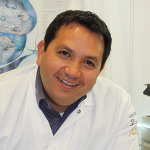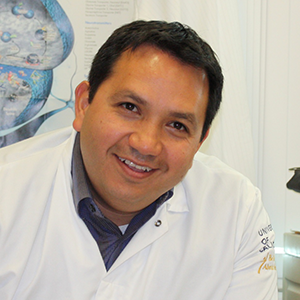 Dr. Adolfo Sequeira works in the Department of Psychiatry and Human Behavior in the School of Medicine. His lab explores the genetic and molecular basis of neuropsychiatric disorders. They focus on major depression, bipolar disorder and schizophrenia. They also study the involvement of stress response alterations at the molecular level in suicide. He started working in a lab during his first year of college and never left! So becoming a professor was a natural progression and joked, “[…] seemed obvious after his soccer and professional sports fisherman careers failed.” He loves research and finds working on important medical and public health problems particularly motivating. Getting funding has been his biggest challenge as a junior faculty. He explains, “Research involves complex politics as well as hierarchical and managerial challenges. With support from my mentors at UCI, I was able to develop a line of research that allowed me to be independent and innovative enough to be competitive to get research grants.”
Dr. Adolfo Sequeira works in the Department of Psychiatry and Human Behavior in the School of Medicine. His lab explores the genetic and molecular basis of neuropsychiatric disorders. They focus on major depression, bipolar disorder and schizophrenia. They also study the involvement of stress response alterations at the molecular level in suicide. He started working in a lab during his first year of college and never left! So becoming a professor was a natural progression and joked, “[…] seemed obvious after his soccer and professional sports fisherman careers failed.” He loves research and finds working on important medical and public health problems particularly motivating. Getting funding has been his biggest challenge as a junior faculty. He explains, “Research involves complex politics as well as hierarchical and managerial challenges. With support from my mentors at UCI, I was able to develop a line of research that allowed me to be independent and innovative enough to be competitive to get research grants.”
He attributes his productivity, in terms of research papers and conference presentations, as a major factor in acquiring his position. But also points to his involvement in the UCI PDA as an extremely helpful experience. He notes, “We focus too much on the lab work as scientist and neglect other aspects of being in academia such as politics, career advancement goals, grant writing and particularly networking. My involvement with the PDA certainly helped me get a good grasp on all those issues. For instance, I attended grant writing seminars and eventually after getting my own grants I was involved in the first series of post-doc oriented grant writing seminars organized by the PDA.” He advises post docs to get involved in other aspects of academic life outside the lab. “Professors spend a lot of their time writing grants/articles, reviewing grants/articles, working on committees, mentoring and networking. Getting involved in the PDA, or other campus organizations, is extremely helpful for your immediate career but also to secure future positions after your post-doc life.”
